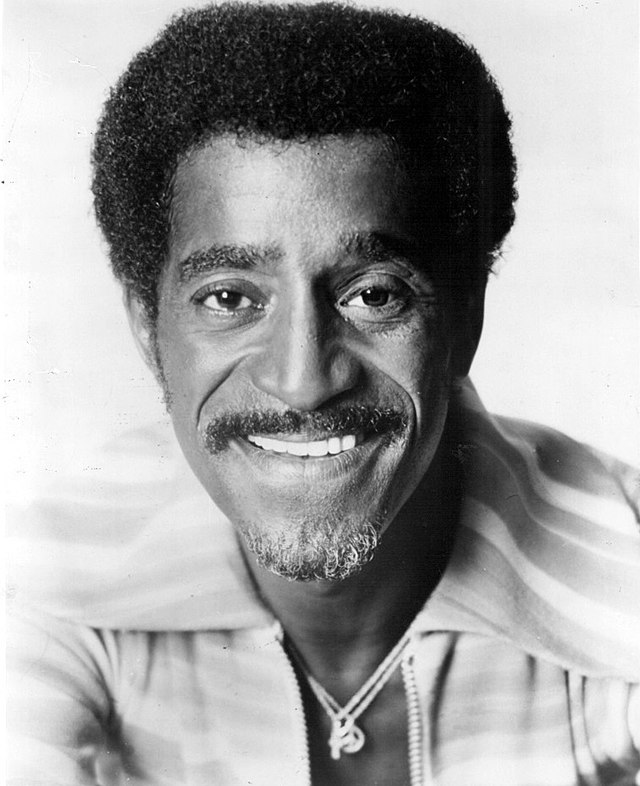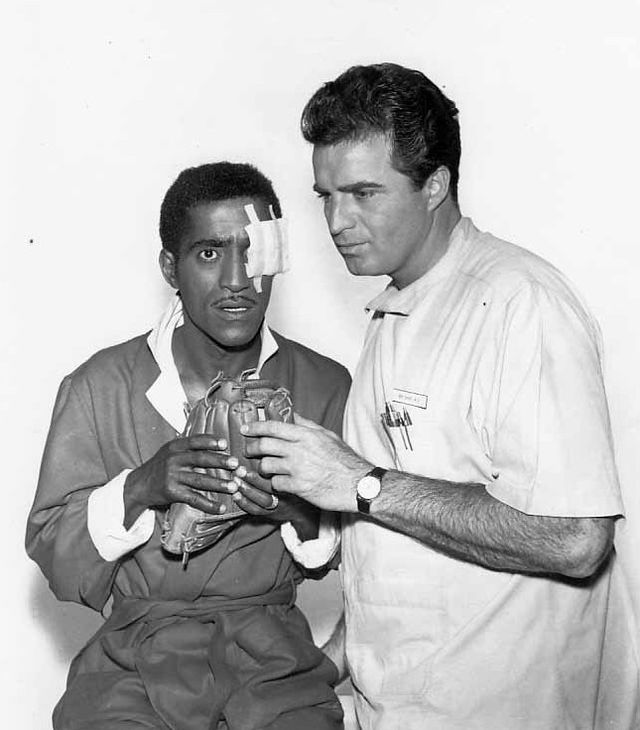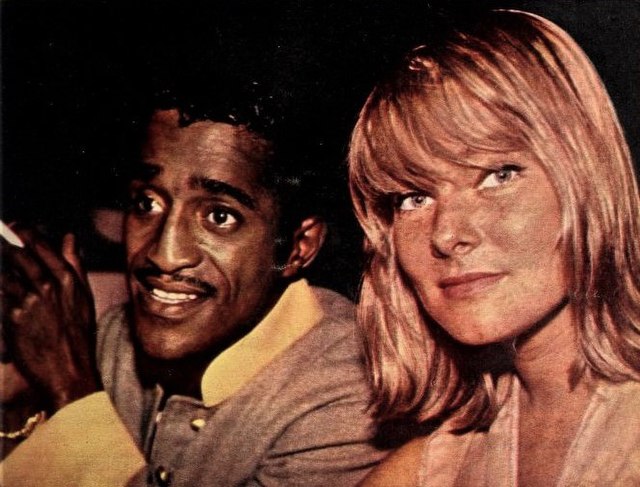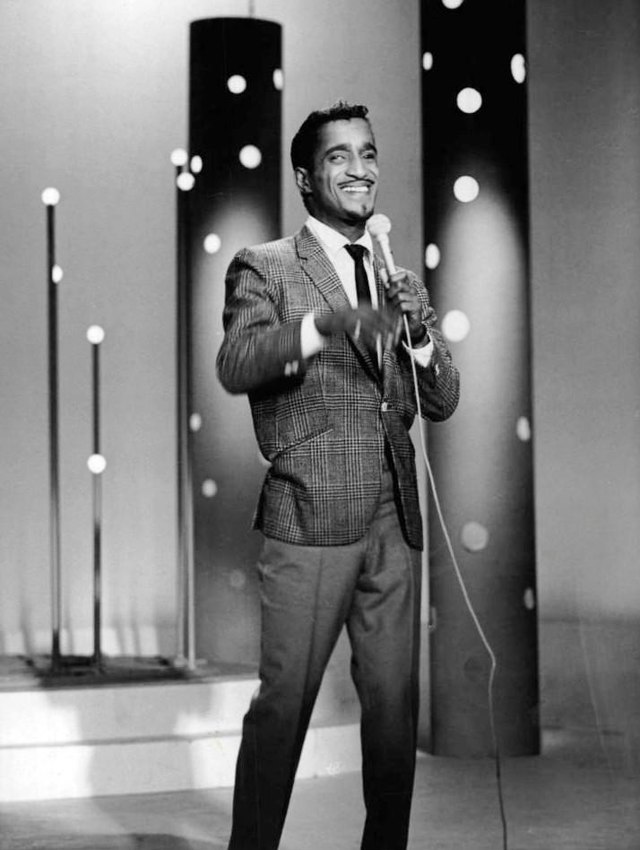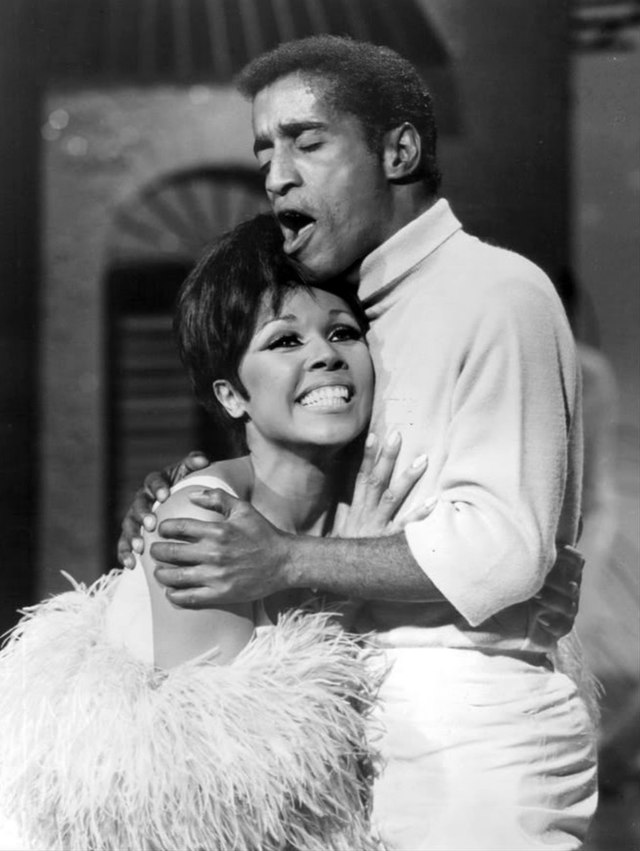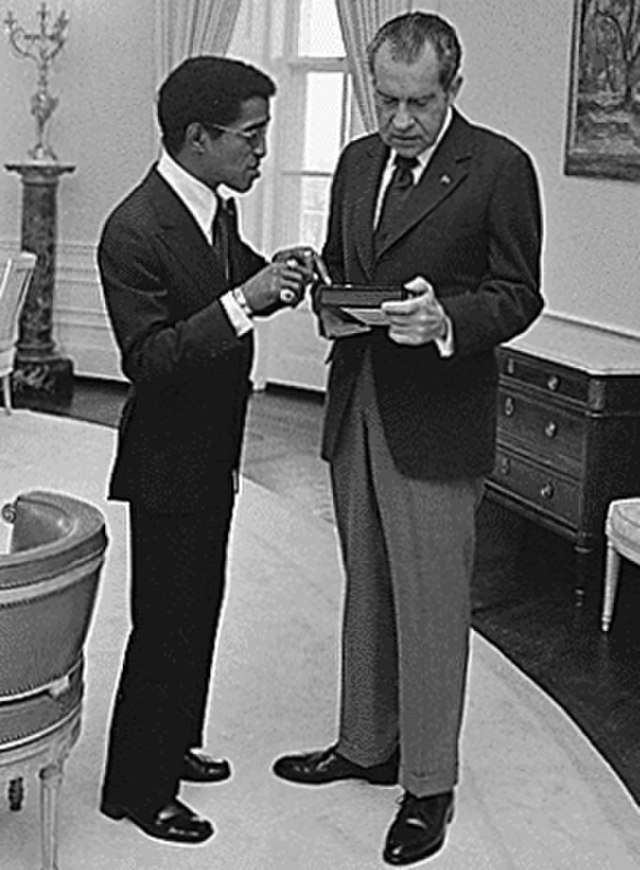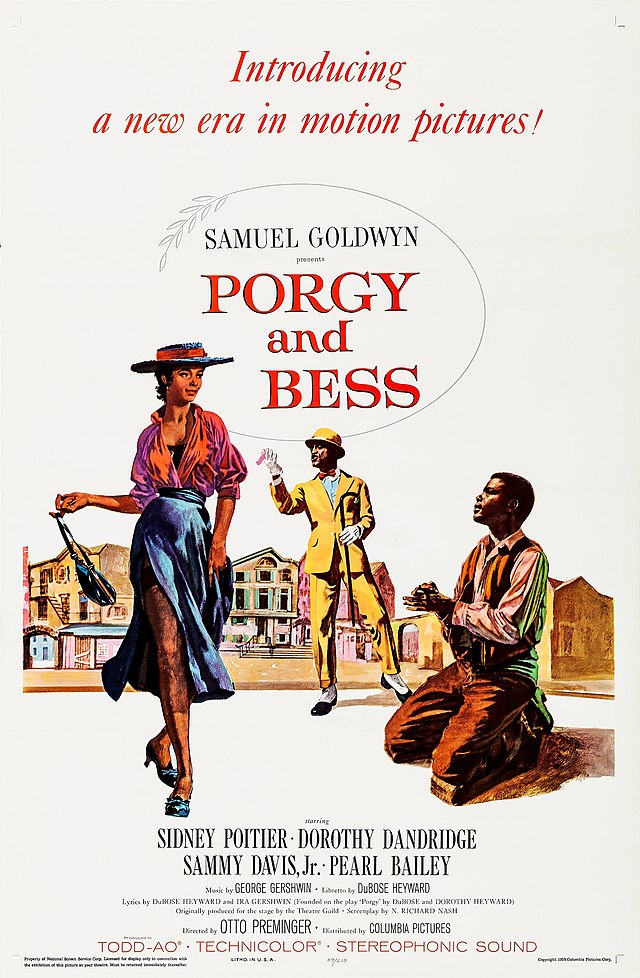Sammy Davis Jr.
back| Full Name | Samuel George Davis Jr. |
| Stage Name | Sammy Davis Jr. |
| Born | December 8, 1925 |
| Birthplace | Harlem, New York City, New York, USA |
| Died | May 16, 1990 |
| Buried | Forest Lawn Memorial Park, Glendale, California, USA |
| Married to | Loray White (m. 1958–1959, divorced) - May Britt (m. 1960–1968, divorced) - Altovise Gore (m. 1970–1990, until his death) |
| Children | Tracey Davis (daughter, with May Britt) - Mark Davis (adopted son, with May Britt) - Jeff Davis (adopted son, with May Britt) - Manny Davis (adopted son, with Altovise Gore) |
| Notable films | Ocean 11 (1960) - Sergeants 3 (1962) - Sweet Charity (1969) - Porgy and Bess (1959) |
Sammy Davis Jr.
Mr. Show Business
Sammy Davis Jr. (1925–1990) was a multi-talented entertainer known for his singing, dancing, acting, and comedic skills. Davis's career soared in the 1950s and 60s, becoming a key member of the Rat Pack alongside Frank Sinatra and Dean Martin.
He broke racial barriers in entertainment, becoming one of the first African-American performers to achieve mainstream success. In 1954, he lost his left eye in a car accident, leading to his conversion to Judaism. His major works include films like Ocean’s 11, Robin and the 7 Hoods, and Broadway's Golden Boy.
Related
Sammy Davis Jr. (1925 – 1990)
Biography and Movie Career
Sammy Davis Jr. was born on December 8, 1925, in Harlem, New York City, to Sammy Davis Sr., a vaudeville performer, and Elvera Sanchez, a tap dancer. His parents were both involved in show business, and Davis was introduced to the stage at a very young age. After his parents separated, his father took custody, and Davis grew up on the road with his father and Will Mastin, the leader of the Will Mastin Trio, a vaudeville act. By age three, Davis joined the group, making his performing debut.
Career Beginnings:
Sammy Davis Jr. showed an incredible talent for dancing, singing, and mimicry. He quickly became the star of the Will Mastin Trio, captivating audiences with his energetic performances and natural charisma. Despite facing racism and segregation, Davis's talent earned him a place in the entertainment world. During World War II, he served in the United States Army, where he faced racial discrimination but found solace in entertaining his fellow soldiers.
Breakthrough and Stardom:
After the war, Davis resumed his entertainment career, performing in nightclubs and theaters. His big break came in 1947 when he performed at Ciro's nightclub in Los Angeles, leading to recognition in Hollywood. His recording of "The Candy Man" became a chart-topping hit, and his association with the Rat Pack, a group of entertainers led by Frank Sinatra, solidified his status as a major star. The Rat Pack, which included Frank Sinatra, Dean Martin, Joey Bishop, and Peter Lawford, was known for its performances in Las Vegas and appearances in films such as "Ocean's 11."
Multitalented Entertainer:
Sammy Davis Jr. was known for his versatility. He was a gifted singer, dancer, actor, and comedian. His live performances were legendary, showcasing his ability to blend music, comedy, and impressions. Davis was also known for his work on Broadway, earning critical acclaim for his role in the musical "Mr. Wonderful" (1956) and the Broadway hit "Golden Boy" (1964), which earned him a Tony Award nomination.
Personal Life:
Davis's personal life was as eventful as his career. He was married three times, most notably to Swedish actress May Britt in 1960, at a time when interracial marriage was still illegal in many parts of the United States. Their marriage caused controversy and even threats from racist groups. Davis converted to Judaism after a near-fatal car accident in 1954, which he believed was a sign from God. His spiritual journey and identity as a black Jewish man were significant aspects of his life.
Later Years and Legacy:
In the later years of his career, Davis continued to perform and make appearances in films and television. Despite struggles with alcohol and drugs, he remained a beloved figure in show business. His final film appearance was in "Tap" (1989), where he displayed his dance talent alongside Gregory Hines. Davis was diagnosed with throat cancer in 1989 and passed away on May 16, 1990, at the age of 64.
Impact and Honors:
Sammy Davis Jr. left an indelible mark on the entertainment industry. He broke racial barriers and became one of the first black performers to gain mainstream acceptance in the predominantly white entertainment industry. His contributions to music, film, and television were recognized with numerous awards, including a Grammy Lifetime Achievement Award. He was posthumously awarded the Kennedy Center Honors in 1987 for his lifetime contributions to American culture through the performing arts.
Conclusion:
Sammy Davis Jr. was a trailblazing entertainer whose talent, versatility, and resilience made him a cultural icon. His legacy lives on through his recordings, films, and the countless artists he inspired.
Sammy Davis Jr. sings Mr. Bojangles:
Charismatic Acting Style of Sammy Davis Jr.:
Charismatic Presence and Stage Command
One of the most defining features of Sammy Davis Jr.'s acting style was his undeniable stage presence. Whether on the silver screen, in a nightclub, or on television, Davis commanded attention the moment he appeared. His performances were filled with an infectious energy that drew audiences in, regardless of the role he was playing. His ability to connect with the audience, often breaking the fourth wall with a knowing smile or a raised eyebrow, showcased his deep connection to his viewers. This charisma made him a natural leading man, capable of carrying scenes with just his presence.
Musicality and Physicality
As a talented singer, dancer, and musician, Davis brought a unique musicality to his acting. His roles often incorporated song and dance, allowing him to showcase his talents fully. In films like "Sweet Charity" and "Tap," Davis's acting was infused with rhythm and movement, blurring the lines between acting and performance art. His tap dancing skills, in particular, were a signature element of his style, demonstrating not only technical prowess but also emotional storytelling through dance. His physicality was evident even in non-musical roles, as he used his body language to express nuances of his characters' emotions and intentions.
Versatility Across Genres
Sammy Davis Jr.'s versatility as an actor was one of his greatest strengths. He seamlessly moved between genres, from comedy and musical to drama and action. In comedic roles, his timing was impeccable, often employing a light touch that made even the most absurd situations believable. Films like "Salt and Pepper" highlight his comedic talents, where his quick wit and sense of humor were on full display. Conversely, in dramatic roles such as "A Man Called Adam," Davis showcased a deeper, more introspective side, portraying complex characters with emotional depth and sincerity. This ability to shift effortlessly between different types of roles demonstrated his comprehensive understanding of the craft.
Emotional Authenticity and Vulnerability
Davis had an innate ability to convey a wide range of emotions authentically, often drawing from his own life experiences. His performances were marked by a sincerity that allowed audiences to empathize with his characters. In "A Man Called Adam," his portrayal of a troubled jazz musician battling personal demons felt raw and genuine, resonating with audiences and critics alike. This emotional authenticity set him apart from many of his contemporaries, as he wasn't afraid to show vulnerability, allowing his characters to be flawed and human. His personal struggles, including experiences with racism and discrimination, often informed his roles, adding layers of depth and realism.
Charm and Wit
Sammy Davis Jr. was known for his sharp wit and natural charm, qualities that were often reflected in his on-screen characters. His dialogue delivery was smooth and engaging, frequently delivered with a smile or a twinkle in his eye. He had a unique ability to make even the most serious or tense moments feel lighter, using humor as a tool to connect with both his fellow actors and the audience. This charm made him a beloved figure, both on and off the screen, and it was a key element of his acting style.
Breaking Racial Barriers
Beyond his technical skills and charisma, Sammy Davis Jr.'s acting style was significant for its cultural impact. He was one of the first African-American performers to achieve widespread success in mainstream entertainment, and he did so by breaking down racial stereotypes. He often chose roles that defied the typical expectations of black actors at the time, portraying characters with depth, intelligence, and complexity. His success paved the way for future generations of African-American performers, making his contribution to the entertainment industry not just artistic, but also historical.
Use of Improvisation and Personal Flair
Sammy Davis Jr. often brought a sense of spontaneity to his performances. His background in live performance and nightclubs gave him a keen sense of improvisation. He was known to inject personal flair into his roles, whether through ad-libbing lines, adding a dance step, or subtly altering his delivery to suit the mood of the scene. This improvisational skill gave his performances a unique, lived-in quality that made them feel fresh and authentic.
Memorable Quotes from Sammy Davis Jr.:
On Life and Success
- "You always have two choices: your commitment versus your fear."
This quote reflects Davis’s belief in the power of perseverance and the importance of overcoming fears to achieve success.
- "Real success is finding your lifework in the work that you love."
Davis emphasized the importance of passion in one’s career, advocating that true success comes from loving what you do.
- "I bought a house in California once, only to find out that they wouldn't sell it to me because I'm black. I told them, 'Then sell it to my wife. She’s white.' They sold it to her, and I bought it from her."
This quote showcases his wit and highlights the racial discrimination he faced. Davis often used humor and his own experiences to address and challenge societal issues.
- "There are certain romances that belong in certain cities, in a certain atmosphere, in a certain time."
This reflective statement from Davis captures the essence of love being tied to time and place, perhaps inspired by his own experiences in various cities and settings.
On His Career and Talent
- "I had more clothes than I had closets, more cars than garage space, but no money."
This quote reflects Davis's honesty about the pitfalls of fame and fortune, touching on the challenges he faced despite his outward success.
- "I was born in a crossfire hurricane."
Davis often felt his life was marked by conflict and struggle, as he navigated the complexities of fame, race, and personal challenges. This metaphor emphasizes the tumultuous nature of his experiences.
- "I'm not looking for sympathy at all. I was just born to amuse people."
Davis saw himself as an entertainer first and foremost, someone who brought joy to others, despite the hardships he faced.
On Race and Identity
- "Being a star made it possible for me to get insulted in places where the average Negro could never hope to go and get insulted."
A poignant and ironic observation by Davis, this quote sheds light on the unique racial challenges he faced as a high-profile African-American entertainer.
- "When you are a black man in America, you are caught in a crossfire."
This statement reflects Davis’s experiences with racial prejudice and the difficult position of being a black man in a predominantly white industry.
- "I'm colored, Jewish, and Puerto Rican. When I move into a neighborhood, people start running four ways at the same time."
Using humor to address his complex identity, Davis acknowledged the multifaceted nature of his heritage and the stereotypes he faced.
On Personal Growth and Philosophy
- "You can be in this business 50 years and still not know anything about it."
A humble acknowledgment of the constant learning and unpredictability of the entertainment industry.
- "I have to be a star like another man has to breathe."
This quote captures the essence of Davis's identity as a performer. For him, being in the spotlight wasn't just a career—it was a necessity for his existence.
- "My whole life is not going to be about racial stories. I refuse to live my life in protest. I’m a human being first and an entertainer second."
Here, Davis emphasizes his desire to be seen beyond his race, focusing on his humanity and his passion for entertaining.
On Relationships and Friendships
- "I've got to be surrounded by people who love me and believe in me."
This quote illustrates Davis’s understanding of the importance of support and love in maintaining one's spirit and well-being, particularly in the often isolating world of show business.
- "We can’t answer King’s assassination with violence. That would be the worst tribute we could pay him."
Spoken after the assassination of Martin Luther King Jr., this statement reflects Davis's commitment to nonviolence and the principles of the Civil Rights Movement.
On His Role as an Entertainer
- "If I am loved for being black, it's only half of what I can be. I can be anything you love because I'm an entertainer."
Davis saw himself as more than his race, aspiring to connect with audiences purely through his talent and personality.
Legacy and Reflections
- "The ultimate mystery is one's own self."
A philosophical reflection on self-awareness and understanding, suggesting that the journey of self-discovery is the greatest of all.
How did Sammy Davis Jr. lose his Eyes:
Sammy Davis Jr. lost his left eye in a car accident that occurred on November 19, 1954.
The Accident
- Event: Davis was driving his Cadillac to Los Angeles from Las Vegas after finishing a recording session. The drive took place on Route 66, near San Bernardino, California. As he approached an intersection, Davis was distracted by a left turn signal ahead.
- Collision: He attempted to make a left turn onto the highway but didn't see a car coming from the opposite direction. His vehicle collided with an oncoming car, a white automobile driven by a woman who had failed to see his turning signal. The impact caused Davis's face to hit the steering wheel, specifically the pointed horn button.
Injury
- Loss of Eye: The impact drove the horn button into Davis’s left eye, causing severe damage. He was rushed to the hospital, but despite the efforts of the medical team, his left eye could not be saved. As a result, his eye was surgically removed.
Aftermath
- Recovery: After losing his eye, Davis was fitted with a glass eye, which he wore for the rest of his life. The recovery period was challenging, both physically and emotionally. During his time in the hospital, he received support from his friends, including Frank Sinatra, who visited him regularly.
- Spiritual Impact: The accident had a profound effect on Davis’s life. During his hospital stay, he began studying Judaism, a faith he eventually converted to. He found comfort and a sense of identity in the religion, which he formally embraced after the accident.
- Career: Despite this life-changing event, Davis’s career did not suffer. He continued to perform with even greater intensity and drive. His resilience in the face of adversity further solidified his reputation as a versatile and dedicated entertainer. The accident and the loss of his eye became part of his persona, and Davis often addressed it with humor and openness in his performances.
Awards and Recognition:
Major Awards and Honors
- Kennedy Center Honors (1987)
One of the most prestigious awards in American arts and culture, the Kennedy Center Honors recognized Davis for his lifetime contributions to American culture through the performing arts. This honor highlighted his impact across multiple entertainment forms, including music, dance, acting, and his role as a trailblazer for African-American artists.
- Grammy Awards
Grammy Lifetime Achievement Award (2001, posthumous): Although Davis did not receive a competitive Grammy during his lifetime, he was posthumously honored with this award to acknowledge his enduring impact on the music industry.
- Emmy Awards
Primetime Emmy Award Nomination (1977): Sammy Davis Jr. received a nomination for Outstanding Variety or Music Program for his television special, Sammy and Company. This nomination underscored his popularity as a television performer and variety show host.
- Tony Awards
Although Davis never won a Tony Award, he earned critical acclaim for his performance in the Broadway musical Golden Boy (1964), which showcased his acting and singing talents. His performance was pivotal in demonstrating his versatility as a performer.
- NAACP Image Awards
Davis received several NAACP Image Awards throughout his career, recognizing his work in breaking down racial barriers in the entertainment industry and his contributions to civil rights. These awards are particularly significant as they honor individuals who have positively impacted the portrayal and representation of people of color in the arts.
- Screen Actors Guild Life Achievement Award (1985)
The Screen Actors Guild (SAG) honored Davis with this award for his career achievements and humanitarian efforts. This award is one of the most esteemed recognitions in the acting community, celebrating performers who have fostered the highest ideals of the acting profession.
- Hollywood Walk of Fame
Sammy Davis Jr. has three stars on the Hollywood Walk of Fame, highlighting his accomplishments across different areas of entertainment:
- Recording (1960): Located at 6254 Hollywood Boulevard, this star acknowledges his contributions to the music industry.
- Television (1960): Located at 8175 Hollywood Boulevard, this star celebrates his work in television.
- Live Theatre/Performance (1989): Located at 9200 Sunset Boulevard, this star recognizes his achievements in live performance.
- Academy of Television Arts & Sciences Hall of Fame (1989)
Davis was inducted into the Television Hall of Fame, an honor given to individuals who have made outstanding contributions to television. This recognition underscored his lasting influence on television as a medium and his role in paving the way for future generations of entertainers.
- Entertainer of the Year Award (1961)
This award, presented by the Golden Globe Awards, acknowledged Davis's exceptional talent and popularity as an entertainer. His receipt of this award highlighted his status as one of the most versatile and beloved performers of his time.
- Spingarn Medal (1972)
Awarded by the NAACP, the Spingarn Medal recognized Davis for his outstanding achievement as an African-American. This medal is awarded annually to honor exceptional achievements by African-Americans in various fields.
- Horatio Alger Award (1975)
This award celebrates individuals who have overcome significant adversity to achieve success. Davis's receipt of this award acknowledged his personal and professional resilience, highlighting his journey from a challenging childhood to becoming a celebrated entertainer.
Additional Recognition and Honors
- Honorary Doctorates
Throughout his career, Sammy Davis Jr. received several honorary doctorates from institutions of higher learning, recognizing his contributions to the arts and his influence on American culture.
- Las Vegas Strip Dedication (1989)
In recognition of his contributions to the entertainment industry and his role in transforming Las Vegas into an entertainment capital, Davis was honored with a dedicated day, “Sammy Davis Jr. Day,” and a segment of the Las Vegas Strip was temporarily named in his honor.
- Inclusion in the United States Postal Service Legends of Hollywood Stamp Series (2001)
Sammy Davis Jr. was commemorated on a U.S. postage stamp as part of the Legends of Hollywood series, recognizing his cultural impact and his status as a legendary figure in the entertainment world.
- Impact on African-American Community and Civil Rights
Beyond formal awards, Davis's impact on the African-American community and his advocacy for civil rights were widely acknowledged. He used his platform to challenge racial barriers, becoming a prominent figure in the Civil Rights Movement. His achievements and pioneering efforts earned him respect and admiration from civil rights organizations and leaders.
Legacy and Influence
Sammy Davis Jr.'s legacy extends far beyond the awards and recognitions he received during his lifetime. As one of the most talented and versatile entertainers of the 20th century, his influence is felt in the realms of music, dance, film, and television. Davis's efforts to break down racial barriers and his commitment to excellence paved the way for future generations of African-American performers. His contributions to the arts and his role as a trailblazer continue to be celebrated, ensuring his place in the annals of entertainment history.
Movies Starring Sammy Davis Jr.:
1930s
Rufus Jones for President (1933)
- Synopsis: In this short musical comedy, Sammy Davis Jr., at just eight years old, plays Rufus Jones, a young boy who dreams of becoming President of the United States. The film is a satirical take on American politics and showcases Davis's early talent.
1940s
Sweet and Low (1947)
- Synopsis: This musical short film features the Will Mastin Trio, including Sammy Davis Jr., performing a number of musical pieces. It's one of Davis's early film appearances, highlighting his dancing and singing abilities.
1950s
The Benny Goodman Story (1956)
- Synopsis: This biographical film about the legendary jazz clarinetist Benny Goodman includes a brief appearance by Sammy Davis Jr. as himself, performing at a nightclub.
Anna Lucasta (1958)
- Synopsis: Davis stars alongside Eartha Kitt in this drama about a troubled woman, Anna Lucasta, and her family's attempts to control her. Sammy Davis Jr. plays Danny Johnson, a love interest who gets entangled in the family's conflicts.
1960s
Porgy and Bess (1959, released in 1960)
- Synopsis: In this musical film adaptation of the George Gershwin opera, Davis plays the character Sportin' Life, a charming but manipulative drug dealer in the poor African-American community of Catfish Row.
Ocean’s 11 (1960)
- Synopsis: Sammy Davis Jr. joins Frank Sinatra, Dean Martin, and other Rat Pack members in this iconic heist film. The group plans to rob five Las Vegas casinos in one night. Davis plays Josh Howard, one of the key members of the heist team.
Pepe (1960)
- Synopsis: This comedy film features Cantinflas as a Mexican ranch hand who goes to Hollywood to find his beloved horse. Davis appears in a cameo role as himself, showcasing his dancing and musical talents.
Sergeants 3 (1962)
- Synopsis: A Western comedy starring the Rat Pack, with Davis playing Jonah Williams, an African-American cavalryman. The film is a humorous take on "Gunga Din," set in the American West.
Convicts 4 (1962)
- Synopsis: This prison drama stars Ben Gazzara and features Davis in a supporting role as Wino, a fellow inmate. The film follows the story of a young artist serving a life sentence in prison.
Johnny Cool (1963)
- Synopsis: Davis makes a cameo appearance as himself in this crime thriller starring Henry Silva as a Sicilian hitman. The film centers on a plot to assassinate Mafia leaders in the United States.
Robin and the 7 Hoods (1964)
- Synopsis: In this musical comedy set in 1920s Chicago, Davis stars alongside Frank Sinatra and Dean Martin. Davis plays Will, a nightclub owner, in this retelling of the Robin Hood legend with a Rat Pack twist.
A Man Called Adam (1966)
- Synopsis: Davis takes on a dramatic role as Adam Johnson, a talented but self-destructive jazz musician struggling with personal demons. The film also stars Cicely Tyson and Louis Armstrong.
Mister Buddwing (1966)
- Synopsis: This drama stars James Garner as a man suffering from amnesia who tries to piece together his identity. Sammy Davis Jr. appears in a cameo as a fellow gambler who offers Garner's character advice.
Salt and Pepper (1968)
- Synopsis: Davis and Peter Lawford star as Charles Salt and Christopher Pepper, two nightclub owners in swinging London who become embroiled in a spy plot. The film is a comedy with elements of action and adventure.
Sweet Charity (1969)
- Synopsis: In this musical film directed by Bob Fosse, Davis makes a memorable cameo as Big Daddy, the charismatic leader of a cult-like group. He performs the show-stopping number "The Rhythm of Life."
1970s
One More Time (1970)
- Synopsis: A sequel to "Salt and Pepper," Davis and Peter Lawford reprise their roles as nightclub owners who find themselves mixed up in espionage. The film features Davis's humor and musical talent.
The Trackers (1971) (TV Movie)
- Synopsis: Davis stars in this Western TV movie alongside Ernest Borgnine. Davis plays a Native American tracker named Ezekiel Smith, helping to find a kidnapped girl.
Poor Devil (1973) (TV Movie)
- Synopsis: In this comedy TV movie, Davis plays a down-on-his-luck demon named Sammy who is sent to Earth to recruit a soul for Satan. The film also stars Christopher Lee and Adam West.
1980s
Sammy Stops the World (1980) (TV Movie)
- Synopsis: This television special is a film adaptation of the musical "Stop the World – I Want to Get Off," with Davis playing the lead role of Littlechap, a man reflecting on his life and relationships.
Alice in Wonderland (1985) (TV Movie)
- Synopsis: In this star-studded TV movie adaptation of Lewis Carroll's classic tale, Davis plays the Caterpillar, delivering a memorable performance of the character's signature lines and songs.
Tap (1989)
- Synopsis: In his final film role, Davis stars alongside Gregory Hines in this drama about the world of tap dancing. Davis plays Max Washington, an old-school tap dancer who helps Hines's character reconnect with his roots.

